Is your kid cruel or unemotional? Do they lack empathy most of the time? If yes, then it might be one of the signs of psychopathy in children.
It’s a good thing to know that people can change if they are exposed to the right conditions. Philosophers like John Locke suggested, human beings are born like “blank slates,” anything written on these slates in their childhood can be changed.
A similar theory was laid by famous psychologist William James, who felt that a person’s personality wasn’t formed fully until the age of 30.
But, if we consider the findings of the 2016 research work of Rebecca Waller and colleagues, the first signs of psychopathy may be visible in children as small as 2 years old.
The psychopathic disposition or antisocial behavior in many can be usually traced back to their early years. People who have known them could see it coming many years ago. They can relate incidents like bullying other kids, abusing helpless animals, and stealing.
Actually, such things are said when people see the psychopath in the present condition and then try to link the past incidents with what he or she may be today. It would be easier to arrive at the correct conclusion if we start examining the incidents of the past for psychopathic tendencies and then analyze if those tendencies became severe as the person moved towards adulthood.
What Is Psychopathy?
In short, “psychopath” is a term used to describe a cluster of characteristics and behaviors that indicate an individual is callous, uncaring, and deceitful. In the current psychiatric terminology, the pattern is generally known as Antisocial Personality Disorder.
As per the American Psychiatric Association, “conduct disorder with callous and unemotional traits” for children ages 12 and over is included in its diagnostic manual, DSM-5. This serious condition signifies interpersonal deficits and can also be linked to harmful behaviors.
To explain the meaning of psychopathy, most definitions are derived from Robert D. Hare’s two-factor model, which differentiates between Factor 1 — superficial charm. The shallow affect, lack of empathy, and manipulative — and Factor 2, no ability to show repentance or remorse, and behavior that is linked with the lifestyle of criminality and impulsiveness that does not match the social standards.
Both these traits can be marked in the juveniles — but, at what age?
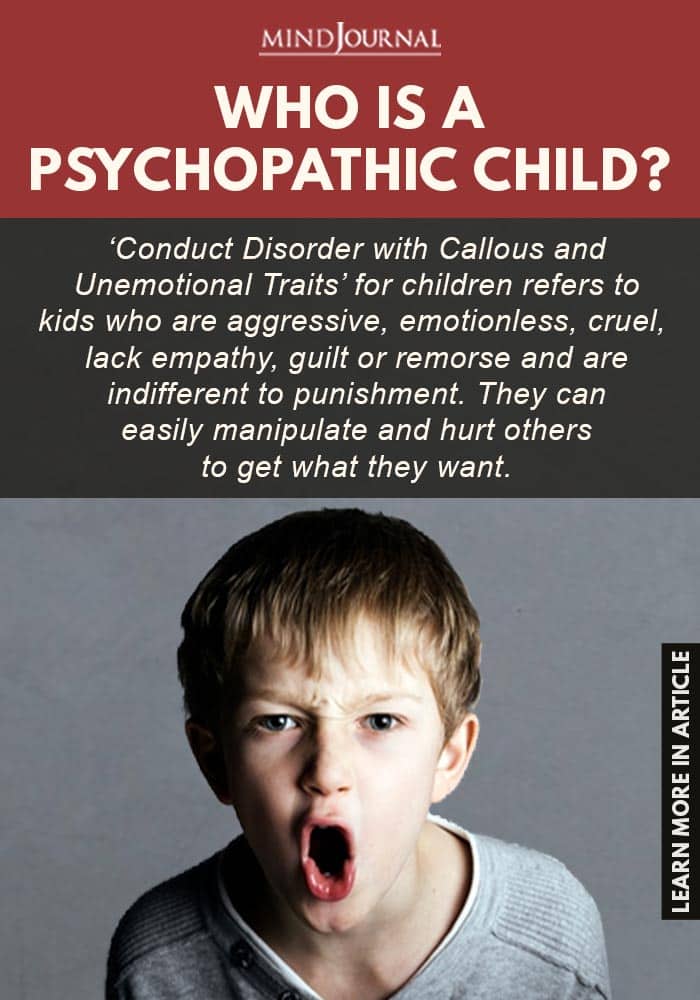
The answer to this crucial question was found by Waller and her team. They studied a sample comprising 731 kids aged 2 years. They studied the kids for two things — Callous-Unemotional (CU) pre-psychopathic behavior of low levels of empathy and guilt, and the general absence of concern for others.
Related: Inside The Mind Of A Girl Who’s Broken By An Emotional Psychopath
However, the researchers did not take into consideration the entire socio-economic scale and the representatives belonged to the lower economic group who were already exposed to several risk factors.
The research team asked the teachers, the primary parent and the other parent to rate their child on Deceitful-Callous (DC) to evaluate both the tendency to show no concern or feelings for others and the tendency to speak lies.
(The CU evaluations in other, similar studies didn’t ask parents and teachers for ratings of deceitfulness.) The DC scale included these five questions. These can be considered as the
Warning Signs of Psychopathy In Children
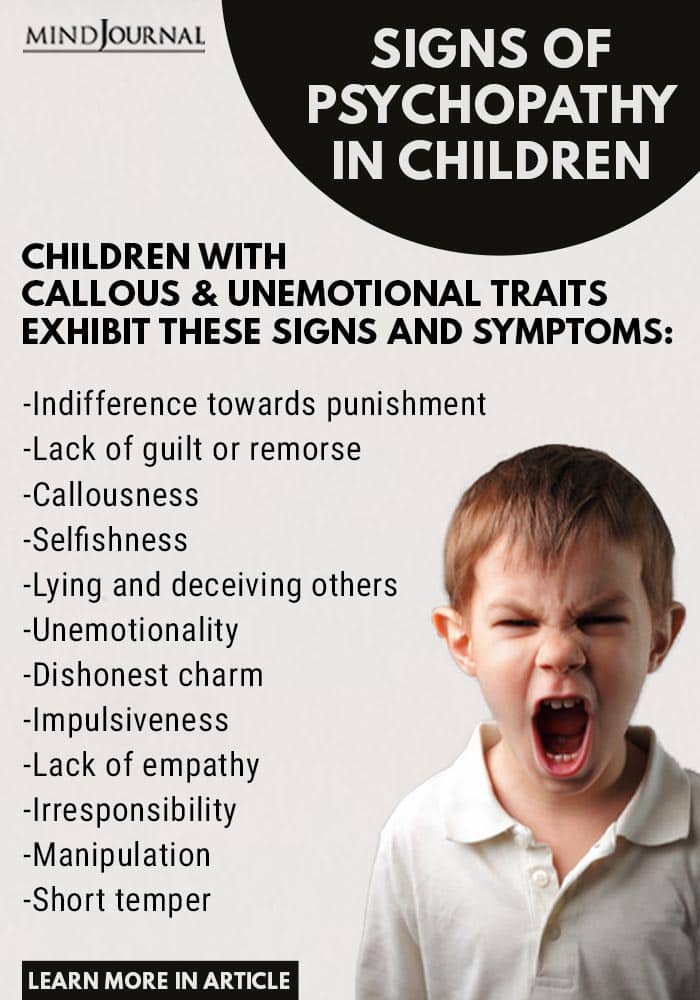
- The child shows no signs of remorse after misbehaving.
- Punishment has no effect on behavior.
- The child is selfish and won’t share.
- The child speaks lies.
- The child is sly and tries to get around me.
The behavior problems in kids were shown by items like fighting with other children, destroying toys as well as other objects, and temper tantrums.
The study was designed in a way that separated behavioral difficulties from personality. This is a very important point as this allowed the researchers to keep the fact out of consideration that those kids who get themselves into trouble as kids continue to do the same when they grew older.
The results showed that the toddlers, who scored high on the DC scale, by age three, grew into children with major behavioral problems. This was an important prediction much more than the implications of earlier behavior foretelling later behavior.
The DC ratings given by mothers of their kids at the age of two were strong enough to predict future behavior issues. By the time the child reached age three, the DC ratings given by teachers and other caregivers became dependable predictors as well.
The researchers followed up with those children again when they were 9. They found that that the children who exhibited the most conduct issues as a toddler or preschooler were more likely to exhibit behavior problems associated with psychopathy later in childhood.
According to this research, a child psychopath exhibits similar traits to those of adult psychopaths. The telltale signs of psychopathy involve a disregard for others’ feelings and a complete lack of remorse.
It is only logical that the person who holds the primary responsibility to care for the child would read the problems quite early in the child’s life than anybody else.
Those who don’t come in close contact with the child may dismiss the disruptive behavior as indications of the “terrible twos,” a problem that may become serious, but not threatening, if it doesn’t become too severe.
Related: 6 Diversion Tactics Used By Sociopaths, Narcissists and Psychopaths to Manipulate You Into Silence
The authors of this research paper are of the view that their work can help in preventing children from going into psychopaths and anti-social.
Since the signs can be identified very early; teachers and parents can take measures to cultivate in them more emotional, positive, and pro-social ways of connecting with others around them.
What causes psychopathy in children?
Some people say psychopaths are born and some say they are made. It’s a never-ending debate. But researchers have found that psychopathy is the result of the cumulative effect of –
- Genetic factors
- Family dynamics (parental separation, poor bonding with parents, etc)
- Life Experiences (physical abuse, negligence, peer victimization, substance abuse, etc.)
- Early exposure to a dysfunctional environment
Some studies showed that children with callous and unemotional traits may have changes in brains because they react differently to fear, sadness, and negative stimuli and experience difficulty recognizing other people’s emotions.
Related: Child Sexual Abuse : Understanding The Dynamics And Signs Of Sexual Abuse In Children
There isn’t any single diagnostic test to determine a child may be a psychopath, but psychologists do have several assessments available to help them assess and measure a child’s symptoms.
Youth Psychopathic Traits Inventory (YPI) is one of the most commonly used assessments. It’s a self-report instrument, meaning that adolescents are given the test and asked to answer the questions about themselves. It’s meant to measure personality traits rather than behavior. The test assesses for the following symptoms:
- Callousness
- Dishonest charm
- Grandiosity
- Impulsiveness
- Irresponsibility
- Lying
- Manipulation
- Remorselessness
- Thrill-seeking
- Unemotionality
Adolescents with high callous and unemotional traits are likely to commit crimes in groups. According to researchers children ranking high in psychopathy are highly likely to be the ringleaders who influence the other members of their group to engage in antisocial behavior.
Related: How Toxic Family Dynamics Can Cause C-PTSD In Emotionally Intense Children
Is psychopathy in children treatable?
There isn’t a specific medication that treats the symptoms of psychopathy, but medication may be part of the treatment plan. Antipsychotic medication, such as risperidone, is effective in decreasing aggression in children with conduct disorder. Mood stabilizers and other medications may also be administered to help a child improve emotional dysregulation.
Related: Sibling Bullying and Abuse: Signs and Effects
As per recent studies, symptoms of psychopathy can improve with intense treatments. However, the interventions should be tailored to each child’s unique cognitive and emotional status and their level of motivation.
The interventions have to be introduced in every aspect of the child’s life. The authors clearly state, “parental characteristics, attitudes, caregiving practices, and the broader family ecology” (p. 1817) should be considered when isolating the risk factors and then making changes to the child’s living environment to increase his or her chances of overcoming the traits in the personality that will lead to grave problems in the future.
Specialized treatment is a must as children who exhibit psychopathy don’t respond to the usual method of discipline. Because they are simply not worried or don’t care about the consequences and if others are disappointed in their choices.
Related: The 5 Child Roles In Dysfunctional Families
Some studies found that reward-based interventions – where children are rewarded for good behavior – can have a positive impact on children’s behavior. Also, learning programs focused on stimulating empathy, problem-solving skills, or skills that can help children cope up with anger or frustration.
Since parents can identify signs of psychopathy in children as early as age two and by the age of three, other people also around the child can read the signs. – it is suggested to seek professional help. A pediatrician or mental health professional can assist in assessing, diagnosing, and treating your child.
Related: The Dangers of Distracted Parenting: Why Parents Need To Put Down Their Phones
Please be noted that even if your children are not a psychopath – they may demonstrate some of the warning signs mentioned above such as lack of empathy. There is nothing to panic. You may treat them as normal children learning new skills and developing a better understanding of life.
However, if the lack of remorse or callousness is consistent and getting worse you may consult a pediatrician for a comprehensive evaluation and determine presence of mental health issues or behavioral or personality problems.
Without treatment, it’s unlikely that psychopathy will improve over time!
Thus, we can say that a future psychopath can be spotted as soon as a child’s personality begins to take shape. This knowledge can be used to change the path of a child’s development.
Did you find this post helpful? Let us know in comments. Also, passed it to your loved ones and those you think is in need to save their children.
Related video on child psychopath signs:
References:
- Cope, L.M., Vincent, G.M., Jobelius, J.L., Nyalakanti, P.K., Calhoun, V.D. and Kiehl, K.A., 2014. Psychopathic traits modulate brain responses to drug cues in incarcerated offenders. Frontiers in human neuroscience, 8, p.87.
- Pisano, S., Muratori, P., Gorga, C., Levantini, V., Iuliano, R., Catone, G., Coppola, G., Milone, A. and Masi, G., 2017. Conduct disorders and psychopathy in children and adolescents: aetiology, clinical presentation and treatment strategies of callous-unemotional traits. Italian journal of pediatrics, 43(1), pp.1-11.
- Hillege, S., Das, J. and de Ruiter, C., 2010. The Youth Psychopathic Traits Inventory: Psychometric properties and its relation to substance use and interpersonal style in a Dutch sample of non-referred adolescents. Journal of Adolescence, 33(1), pp.83-91.
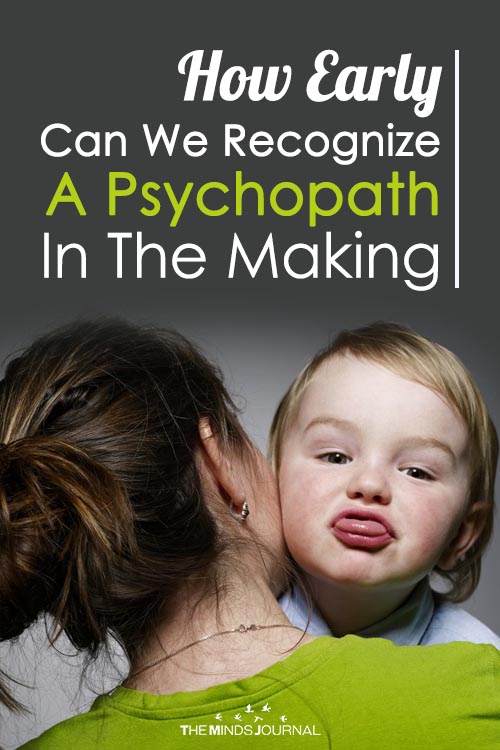
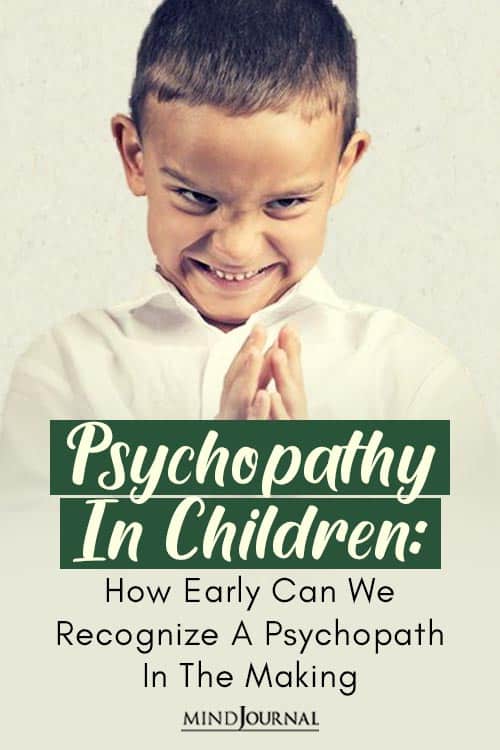
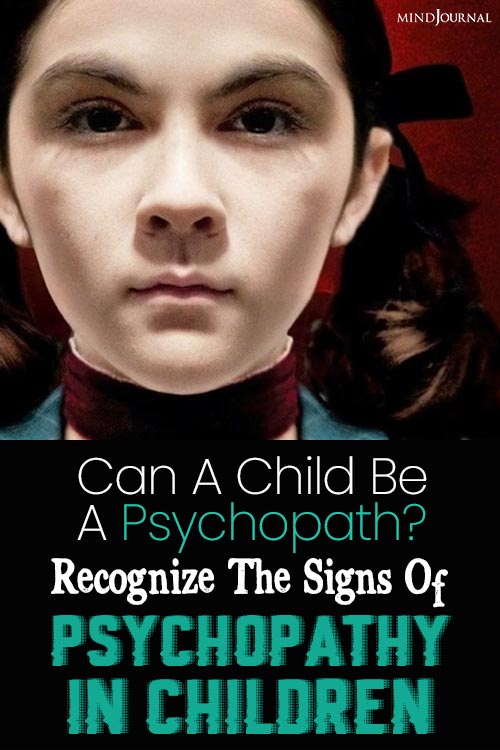









Leave a Reply